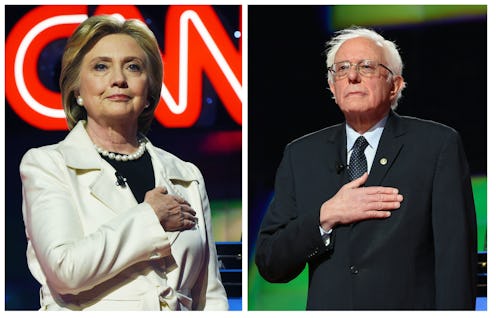News
Something To Remember About Presidential Debates
Hillary Clinton and Bernie Sanders had a raucous, lively debate in New York on Tuesday night, and not surprisingly, both of them took a couple of cheap shots at one another. From Sanders' attacks on Clinton's role in the Libyan intervention to Clinton's criticisms of Sanders' record on guns, the Democrats both took intellectual shortcuts in order to score points during the debate. On Twitter, New York Times journalist Nick Kristof made an important point that everyone would be well-advised to keep in mind when candidates hash out their differences in front of a live televised audience.
"Alas, debates reward slogans and over-simplification," Kristof wrote. "Governing is messy & complex, with tradeoffs--and more problems than solutions."
It's a very important point, and one that's easy to lose sight of during presidential campaigns. Both Clinton and Sanders were guilty of deploying slogans and over-simplified attacks on Tuesday night, and while this a time-honored political strategy for winning debates, it doesn't result in an honest characterization of how government actually works.
During a segment on gun control, Clinton highlighted the pro-gun positions Sanders has taken during his time as a Vermont senator. While it's true that Sanders has opposed some gun control measures, the context matters. As Sanders himself has pointed out, you can't really get elected to the Senate in Vermont if you oppose guns too strongly, given the number of gun owners in the state. This might not be ideal, but it's true, and moreover, Sanders has since moved to the left on guns. And sure, Sanders was endorsed by the National Rifle Association during his 1990 election to the House of Representatives, but this was more due to the NRA's hatred Sanders' opponent than their love for Sanders.
Meanwhile, Sanders took shots at Clinton for supporting, in her capacity of secretary of state, the 2011 military intervention in Libya. It's undeniable that post-intervention Libya is an unmitigated disaster, but it's a bit unfair to blame Clinton for that. It's exceedingly difficult to dictate the course a country will take after its leader has been toppled, and it's not clear America could have done anything to prevent Libya from descending into chaos. Let's not forget that the intervention was launched to prevent an impending massacre of the Libyan people and had near-universal support from world leaders. As far as military interventions go, the Libyan one had some very strong arguments on its side, and at the time, it was applauded by liberals as a textbook multilateral intervention.
Governing is complicated, dirty business, and any individual decision can only be understood with a healthy degree of context. It makes sense that Sanders and Clinton would take shortcuts while criticizing each other, but it doesn't actually help educated voters. And that's supposed to be the point of a debate.
